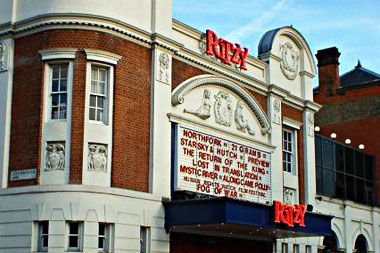How cinema bosses' redundancy statement soured Living Wage deal

Industrial relations collapse at famous local movie house, with staff citing betrayal after pay pact is followed by layoffs
Jermaine Haughton
Bewilderment has seized staff at Brixton’s Ritzy Cinema, after its parent company Picturehouse announced a series of redundancies – just weeks after signing up to a Living Wage deal. The layoffs have been seen as a cynical attempt to balance the books, in the wake of Picturehouse’s commitment to enhancing pay at the well-known London venue.
Following a year-long battle to have their pay increased to £8.80 per hour, accompanied by a 26% pay rise over three years – a campaign that won the backing of esteemed film directors Ken Loach and Mike Leigh – Picturehouse senior executives have launched a consultation into redundancies and expect to lose at least 20 of the Ritzy’s 93 staff. The process is expected to be completed within 90 days from the end of November.
In a letter to staff, Picturehouse managers said: “The reasons behind the proposals are to improve the consistency of customer service, reduce management time spent on recruitment, training, HR and payroll processes, reduce staffing costs and remove the reliance on zero-hours contracts.”
As well as posing bad publicity for Picturehouse, the development has brought to the fore a range of potential difficulties that managers could face from the introduction of a change in policy, and on that basis may act as a warning for other bosses on how to plan ahead for the Living Wage. Cinema workers’ union BECTU has accused Picturehouse Cinemas of moving away from some of the promises it made on 31 July, when ACAS oversaw the signing of the Living Wage agreement. The contract included clauses such as “Working patterns for existing staff will be maintained”, and “the intention is not to reduce flexibility significantly”.
BECTU staff at the Brixton site wrote in a letter to Picturehouse director of operations Alastair Oatey: “So the question is … in terms of the honesty, integrity and ethics of the Picturehouse group, and of its directors in particular, how can you sign up to the good intentions [of] the ACAS Agreement, ignore them just a matter of weeks later, and instead threaten the jobs and livelihood of the BECTU members at the Ritzy?”
Significantly, Picturehouse started out as an independent chain that set out to offer audiences alternatives to multiplex fare, but its outlook has changed since it was acquired by Cineworld – a leading multiplex brand – in 2012.
Staff at the cinema have taken to social media to express their anger at the proposed cuts. In a 24 October post on the Living Wage for Ritzy Staff Facebook page, campaigning workers wrote: “While there is no evidence of financial problems at the site – in fact we regularly come number 1 in monthly profits – the company proposes that lowering its workforce by a quarter will improve the cinematic experience which a skeleton number of staff are already working incredibly hard to deliver.”
The post added: “NO OTHER site in the company is facing redundancies and NO OTHER site is subject to these dramatic changes. This is nothing short of a scandalous provocation which is set out to undermine a year’s worth of hard work to gain a bare minimum wage rise – nothing short of backhanded corruption of statistics, nothing short of pure vindictive retaliation because we the workers showed that with determination and unity, we could effect change to make our lives that tiny bit more comfortable.”
Local author and TV personality Will Self has said that he will now boycott the venue. Writing in London’s Evening Standard yesterday, Self accused the cinema’s owners of losing touch with history since it was taken over. “I well remember the Picturehouse cinemas when they started up,” he wrote. “Like the Screens on the Green and the Hill that came before them, these were intended to be hip venues, showing arthouse cinema to a young and diverse crowd. The ambience of the Picturehouse cinemas is designed to make the punters feel as if they’re part of a big happy, raggedy family of enthusiasts, all keen on frothy coffee, flapjacks and the intense screen presence of Michael Fassbender. The reality is that since the chain was swallowed by the mighty Cineworld, this image has simply been a selling point to be ruthlessly exploited in the pursuit of higher profits.”
In Self’s view, the redundancies are a result of Cineworld greed: “If I seriously believed that the vast Cineworld chain would go under if it paid all its existing London employees the London Living Wage,” he added, “I might have a scintilla of sympathy for their position, but I don’t. The truth is that the bean-counters are trying to cut costs and boost profits by attacking their own employees, employees who often take this part-time employment precisely because they themselves are aspirant purveyors of cultural capital – wannabe musicians, writers, actors and film-makers.
“Enough is enough: until the Picturehouse management resile from these redundancies I shan’t be darkening their darkness.”
For more on these issues, read this special CMI blog on employee engagement.
Image of Brixon’s Ritzy cinema courtesy of the Wikimedia Commons.

Press & Media Enquiries
For more information or to request interviews, contact CMI's Press Team on 020 7421 2705 or email press.office@managers.org.uk


